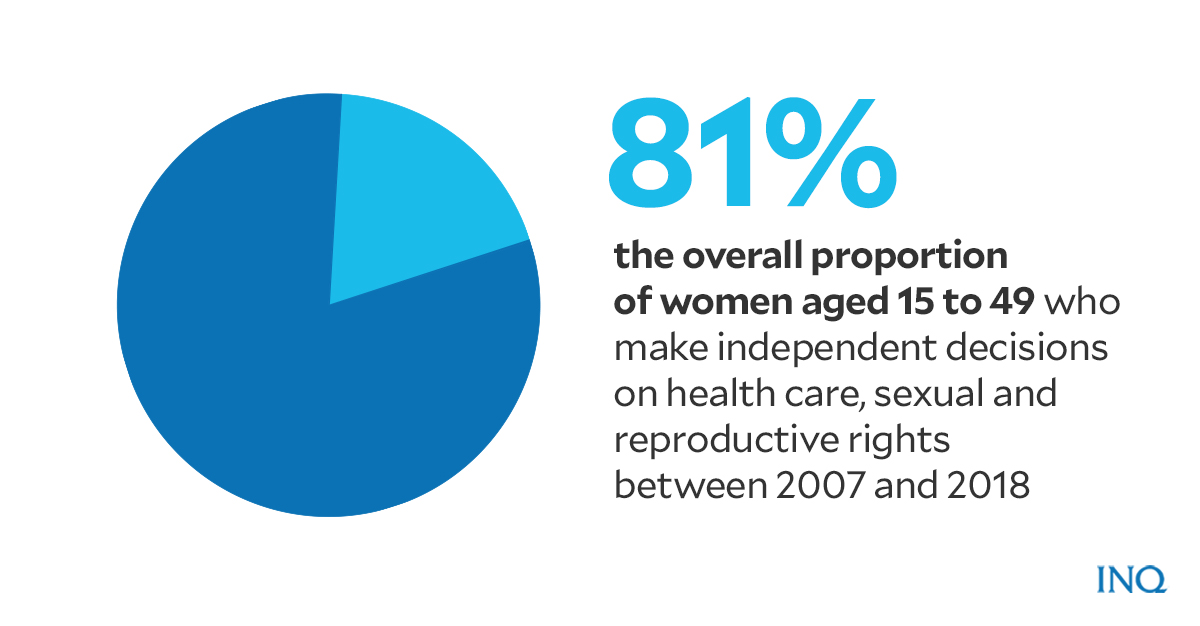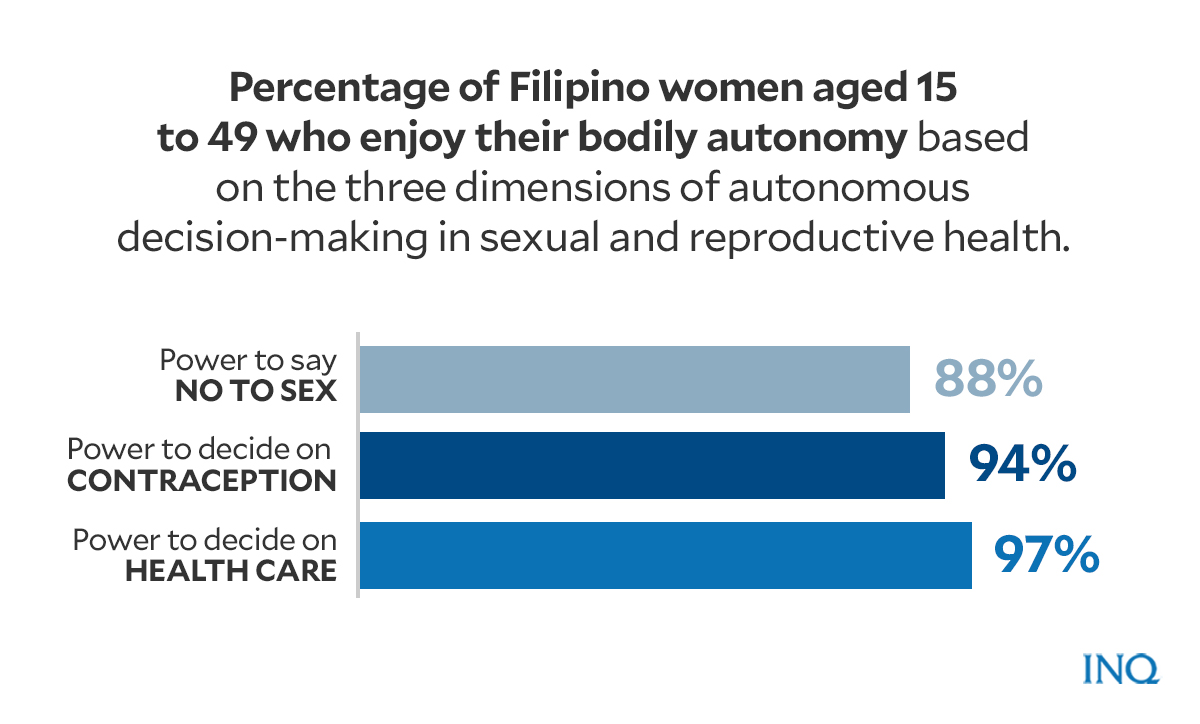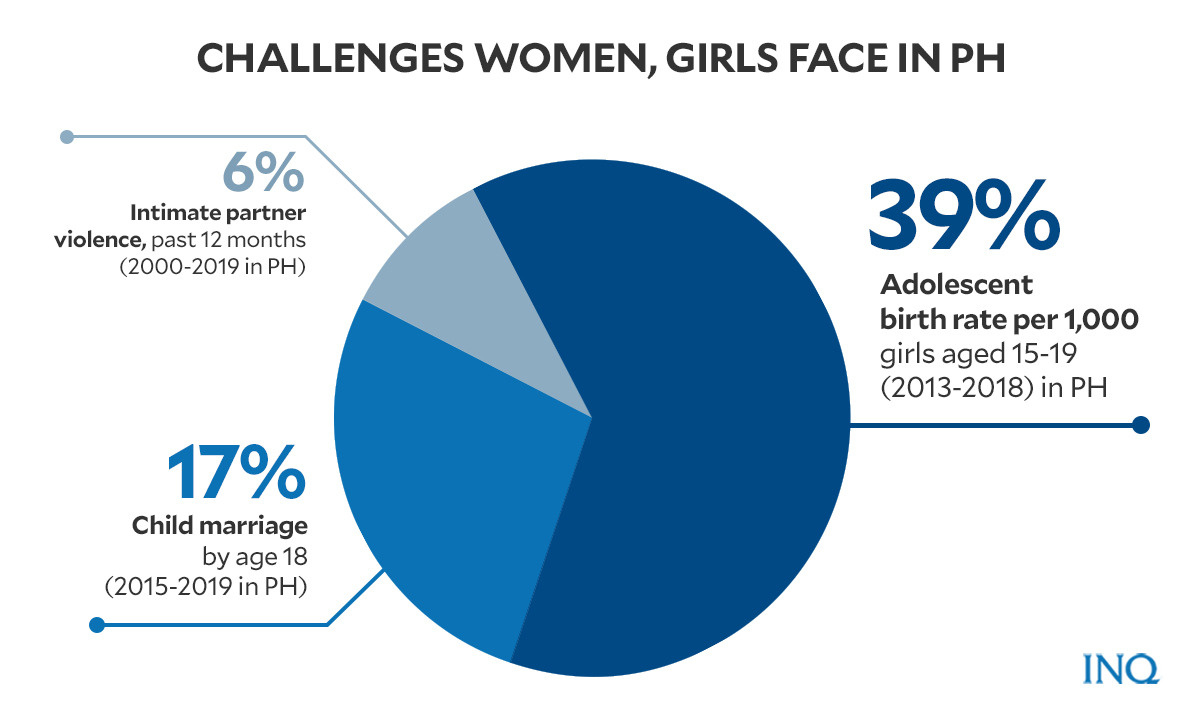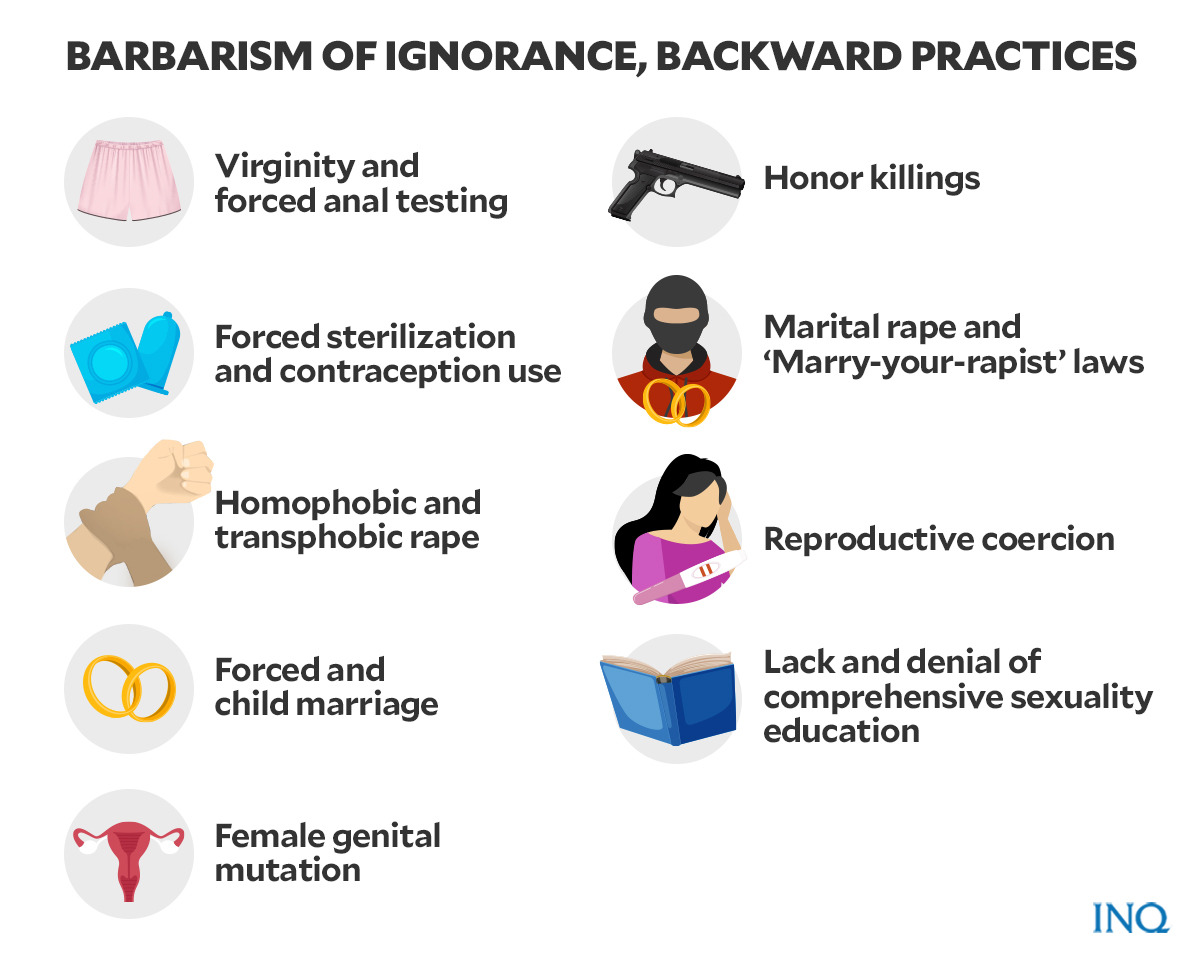EXPLAINER: Your body, your choice: Why is bodily autonomy so important?
MANILA, Philippines—The United Nations Population Fund (UNFPA) and the Philippine Commission on Population and Development (Popcom) on Wednesday (May 19) launched the latest State of the World Population (SWOP) report that highlights bodily autonomy, or a person’s right to decide what to do with his or her body.
It’s a rarely discussed issue but one that’s highly important, especially for women.
In the report “My Body is My Own: Claiming the Right to Autonomy and Self-Determination,” UNFPA detailed the situation of women in 104 countries, including the Philippines, in relation to bodily autonomy.
Before diving into UNFPA’s findings, we should first know more about this human right and why it is so important to uphold.
What is bodily autonomy?
According to UNFPA, bodily autonomy refers to women’s right to make independent decisions involving their bodies and ranging from reproductive health, when to have sex and when to have children.
“This includes when, whether or with whom to have sex,” said UNFPA on its website.
Article continues after this advertisement“It includes when, whether or with whom you want to become pregnant,” the UN agency. “It means the freedom to go to a doctor whenever you need one,” it added.
Article continues after this advertisementUNFPA, in its report, detailed that the concept of bodily autonomy in the context of the women empowerment movement, which first emerged in the 1970s.
Bodily autonomy as a human right was then adopted by the sexual and reproductive health and rights movement.
During the International Conference on Population and Development (ICPD) in 1994, the term “autonomy” was given another meaning.
Empowering women and giving them the right to exercise autonomy on their bodies has been linked with their political, social, economic or health status and was considered as a “highly important end in itself and is essential for the achievement of sustainable development.”
The word autonomy was paired with another, bodily, and has since become part of the lexicon of human rights advocates, activists and experts on sexuality, health, reproductive rights, sexual orientation, etc.
“While the term has become part of the vernacular of the feminist and sexual and reproductive health and rights movements, it continues to elude simple definition and easy measurement,” said UNFPA.
How can we measure bodily autonomy?
To monitor bodily autonomy among women and girls, the international community follows two indicators in the United Nations’ Sustainable Development Goal (SDG) on gender equality.
The first, SDG Indicator 5.6.1, measures the proportion of women aged 15 to 49 who make their own informed decisions on sexual relations, contraceptive use and reproductive health care.
It is based on survey responses to the following questions:
• Who usually makes decisions about health care for yourself?
• Who usually makes the decision on whether or not you should use contraception?
• Can you say no to your husband or partner if you do not want to have sexual intercourse?
“Only women who make their own decisions in all three of these areas are considered to have autonomy in reproductive health decision-making and to be empowered to exercise their reproductive rights,” said UNFPA.
The second, indicator 5.6.2, aims to track laws and regulations that guarantee full and equal access to women and men to sexual and reproductive health care, information and education.
It covers policies on maternity care, contraception and family planning, comprehensive sexuality education and information, and sexual health and wellbeing
“The indicator measures whether a supportive law exists and whether there are restrictions, such as age limitations or spousal permission requirements,” explained UNFPA.
While there are already ways to measure bodily autonomy, the UNFPA said these were just the starting points.
“We don’t yet have good measurements, but we know that loss of bodily autonomy is rampant around the world,” said Dr. Leila Joudane, UNFPA Philippines country representative, at an online press conference last Monday (May 17).
“These measurements are critical, but they offer only a glimpse into the bodily self-determination of people around the world,” Joudane said.
Determinants of women’s decision-making power
There are also several social and economic factors cited by UNFPA, which can influence a woman’s decision-making in connection to bodily autonomy.
These include:
• Knowledge on sexual and reproductive health and rights.
• Pressures or encouragement from the community. In some communities, norms and values may dictate a woman’s notion of bodily autonomy.
“Communities may pressure women to bear children and may generally perpetuate views that women should be submissive and passive in sexual relations,” said UNFPA.
“At the same time, community norms can often dissuade women from discussing matters of sexual and reproductive health with men, making it difficult, if not impossible, for women to negotiate sexual relations, contraceptive use and reproductive health care,” it added.
Availability or lack of health system for women and girls
A woman’s inability to decide about contraception and reproductive health care can also be attributed to barriers in the health system.
Some issues included distance to nearest clinics and facilities, the lack of adolescent and youth responsive services, limited contraception methods or options.
Having readily available and accurate information regarding contraceptive information can help women make better decisions.
Women’s relationship with husband, partners or extended family
On many occasions, men make most of the decisions—including those related to sexual and reproductive health issues which are often perceived as “women’s matters,” according to UNFPA.
“Gender norms typically assign women the sole responsibility for reproductive health but at the same time deny them decision-making power,” the agency continued.
Socioeconomic circumstances
Unfortunately, for many women around the world, educational attainment remains a factor in determining ability to refuse sex and decide about contraception and health care.
A separate study by UNFPA showed that “a woman who has less education than her husband or partner is more likely to be subjected to sexual violence than a woman whose education level is more or less equal to that of her husband.”
“Meanwhile, girls and women in the two lower wealth quintiles are also more likely to have experienced unwanted sexual relations,” it added.
Why is it important to discuss bodily autonomy?
Monitoring and discussing bodily autonomy help women and girls know more about their rights in deciding for their own bodies. It also encourages them to exercise choices about what happens to their bodies.
“When individuals, women and young people, in particular, have control over their bodies, they ultimately have control over the other aspects of their wellbeing, lives and futures,” Joudane explained.
“Such individual empowerment likewise empowers families, communities, and the whole country,” she said.
By the numbers:
While UNFP’s data cover only some countries, findings showed what the agency described as “an alarming picture of the state of bodily autonomy for millions of women and girls.”
The report said women and girls worldwide enjoy only 75 percent of legal rights being enjoyed by men even if policies or laws mandating gender equality are already in place in several countries.
In terms of bodily autonomy, only 55 percent of women and girls from 2007-2018 were able to make their own decisions in all three dimensions of bodily autonomy—based on indicator 5.6.1 of the UN SDG.
“That means that little more than one in two women and girls has the power to decide whether and when to seek health care, including sexual and reproductive health services, whether to use contraception and whether and when to have sex with their partner or husband,” UNFPA explained.
In five Eastern Asia and Southeastern Asian countries, 76 percent of women and children said they enjoy the right to bodily autonomy.
Around 86 percent said they’re able to exercise their freedom to say no to sex, 94 percent were able to decide on contraception use and 92 percent were able to practice the right to decide on health care.
In the Philippines, according to the presentation of UNFPA and POPCOM, there were encouraging numbers in the level of Filipino women’s decision-making on health care, sexual and reproductive health, and rights.
https://newsinfo.inquirer.net/1433823/when-to-have-sex-ph-women-showing-independence-but-more-needs-to-be-done-say-experts?utm_medium=Social&utm_source=Twitter#Echobox=1621412596-1
The overall proportion of Filipino women aged 15 to 49 who make independent decisions on health care, sexual and reproductive rights between 2007 and 2018 was 81 percent.
At least 88 percent of Filipino women say they are able to exercise their right to reject sexual intercourse. Some 94 percent had access and decided to use contraception. At least 97 percent had access and decided independently on health care that included sexual and reproductive health services.
In terms of the country’s laws and regulations that help guarantee full and equal access to women and men aged 15 years and older to sexual and reproductive health care, information and education, the Philippines also recorded a decent score.
This was measured using the four topics and 13 components tracked under indicator 5.6.2 of the UN SDG.
For maternity care, the first component, the Philippines had a category average of 63 percent.
According to UNFP’s data, the country had sufficient laws that guarantee access to maternity care services while life-saving medicines and supplies are also available for some Filipino women.
However, while the country offers post-abortion care, abortion itself remains illegal in the country as it is still “highly stigmatized,” according to Guttmacher Instituteresearch, a research and policy organization.
The organization found in its 2013 report that at least 1,000 Filipino women die each year due to abortion complications.
“Tens of thousands of women are hospitalized each year for complications from unsafe abortion,” the report added.
The Philippines’ level of contraceptive services was 53 percent. Even though contraceptive consent is being fully practiced, there are still gaps in different contraceptive services including the use of emergency contraception.
The Philippines had a perfect record on sex education, according to UNFPA. It said the country had a 100 percent achievement on laws mandating sex education
The country’s category average for HIV and HPV was 90 percent.
The report found that HIV counseling and test services and care and treatment services are available and highly confidential.
Filipino women are increasingly making their own decisions about their bodies, when to have intercourse, get pregnant, or rear a child but policies and laws supporting this right needed enforcement, according to UNFPA and POPCOM.
“In the Philippines, we are doing very well but still, there is a lot where we need to do more,” said Joudane. “I can see that there is a political will to do more, to ensure that women and girls have the right to enjoy their bodily autonomy,” Joudane said.
“It is important to ensure that the laws in place are implemented, this is where the Philippines need to do more,” she added.
Dr. Juan Antonio A. Perez III, Popcom executive director, said to correct the anomaly, the government must support programs protecting the rights of young people to self-determination and bodily autonomy.
Such programs included sex education in all schools, which could also mean age-appropriate lessons for children to understand their bodies and sexuality at a young age.
Denial of bodily autonomy and integrity
Many women still face challenges on bodily autonomy. Some of these constraints include:
• Virginity and forced anal testing. According to UNFPA, virginity testing and forced anal testing are “invasive and unscientific tests to prove whether a girl or woman has had sexual intercourse or to prove homosexual conduct.” The agency said the practice remains prevalent is several countries.
• Forced sterilization and contraception. “In countries around the world, persons with disabilities, indigenous communities and persecuted minorities, and in some cases women in general, have been subjected to forced contraception or sterilization for reasons ranging from eugenics to population control,” UNFPA reported. This is considered as a violation of human rights and medical ethics.
• Homophobic and transphobic rape. Impunity and discrimination against the LGBTI community often lead to rape and other sexual violence targeted at gender-non-conforming individuals, the agency said.
Other issues include:
• Forced and child marriage
• Female genital mutation
• “Honor” killings
• Marital rape and “marry-your-rapist” laws
• Reproductive coercion
• Lack and denial of comprehensive sex education
“[T]here are many bodily autonomy issues that remain hotly contested, which are unresolved by human rights agreements and international law, such as voluntary sex work, surrogacy and abortion,” UNFPA added.
“[T]hese issues are frequently driven underground, they are often poorly understood by researchers and lawmakers alike.”



